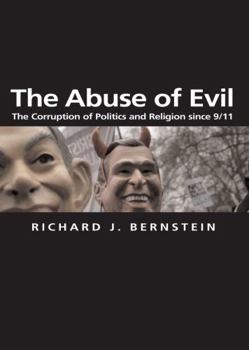The Abuse of Evil: The Corruption of Politics and Religion Since 9/11
Select Format
Select Condition 
Book Overview
Since 9/11 politicians, preachers, conservatives and the media are all speaking about evil. In the past the dicourse about evil in our religious, philosophic and literary traditions has provoked thinking, questioning and inquiry. But today the appeal to evil is being used as a political tool to obscure compex issues, block serious thinking and stifle public discussion and debate. We are now confronting a clash of mentalities, not a clash of...
Format:Paperback
Language:English
ISBN:074563494X
ISBN13:9780745634944
Release Date:January 2006
Publisher:Polity Press
Length:144 Pages
Weight:0.40 lbs.
Dimensions:0.4" x 5.3" x 7.6"
Customer Reviews
2 ratings
Richard Bernstein on Evil in the Post 9/11 World
Published by Thriftbooks.com User , 18 years ago
This is a very necessary book. It upends the simplistic desire to polarize everything: us vs. them, good vs, evil, the "coalition of the willing" vs. the "axis of evil." And in doing so creates a much more complex awareness of evil in all its radical "otherness." I liked this short book so much that I went on to read Bernstein's Radical Evil: A Philosophical Interrogation (2002) where he deals with issues more in depth with critical chapters on Freud, Nietzsche, Arendt. Schelling, Levinas, Kant, etc. I particularly liked his lines: "Interrogating evil is an ongoing, open-ended process"; "Evil is an excess that resists total comprehension"; "Evil resists all attempts to justify it; it resists theodicy"; and "The power of evil and the human propensity to commit evil deeds must not be underestimated."
Manichaean Manipulators Unmasked
Published by Thriftbooks.com User , 18 years ago
Taking as his subject the danger political and religious absolutism poses to democracy, Richard J. Bernstein, a professor at Philosophy at the New School for Social Research in New York, seeks to show in THE ABUSE OF EVIL: The Corruption of Politics and Relgion Since 911 (Polity, 2005) how the Bush administration has used what he calls the absolutist mentality to choke off public discussion and criticism of the Iraqi invasion (and for that matter, everything else, too). Those who wish to understand how members of this and previous administrations have deployed the absolutist mentality against American democracy, and who wish to understand how they might counter its perniciousness will find this book extremely useful. Bernstein begins his discussion with an explanation of a pair of related framing assumptions he calls the "grand Either/Or" and "the Cartesian Anxiety." This terminology may sound fairly esoteric, but the concepts are straightforward. They go a long way toward demystifying and elucidating how the Bush administration's strategy for stifling dissent works. The grand Either/Or grows out of "what [the philosopher Descartes] took to be the grand Either/Or that we confront: Either solid foundations and indubitable knowledge Or a swamp of unfounded and ungrounded opinion." (page 27). The Cartesian Anxiety is, according to Bernstein the "quest for some fixed ground, some stable rock upon which we can secure our lives against the vicissitudes that constantly threaten us." (page 27) He goes on to say "...that those today who claim religious or moral certainty for dividing the world into the forces of good and the forces of evil are shaped by this Cartesian Anxiety." (page 28). Those who have read Shadia Drury's account of right wing political theorist Leo Strauss, LEO STRAUSS AND THE AMERICAN RIGHT will recognize this preference for the absolute in the anti-democratic analysis and program of the Straussians. Based on their exoteric/esoteric readings of Plato's Republic and other classical political texts, Straussians imagine themselves as an intellectual pastorate who must defend society against the depredations of Liberalism -- that socially disruptive idea which insists on equality of opportunity and justice. The grand Either/Or they posit based on their readings is between a beneficent plutocracy and anarchy. They see themselves as members of the plutocracy, of course. Not surprisingly, many members of and advisers to the Bush regime find congenial Strauss' anti-democratic theories. Those who have read George Lakoff's MORAL POLITICS, will recognize the grand Either/Or as the "Strict Father" narrative which reinforces a right-wing program of top-down ideologically reinforced hierarchy -- a disciplinary program where punishment is more important than reward -- a program which believers are told flows out of the natural moral order established by God. The "Or" in the right's formulation in this case could be called the Weak Mother / Femini




